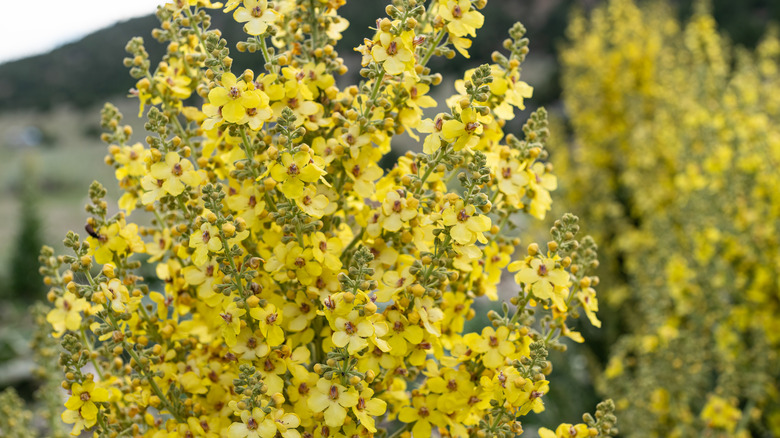The Invasive 'Weed' That May Help Improve Your Soil's Health
The weed conundrum continues to puzzle gardeners. You know certain plants are considered weeds because they are invasive or have other negative characteristics, but some of them tempt and attract you anyway. Some weeds, like goldenrod, have beauty as their redeeming quality. Others, like dandelions, are wonderful for pollinators. Yet, we know these plants have downsides, such as their tendency to spread.
There are, however, weeds that are actually good to grow or keep around if they pop up in your garden. One such plant classified as a weed has a little-known super power, but it can also be problematic. Fuzzy-leaved common mullein (Verbascum thapsus) grows a stalk out of a rosette-shaped base, with pretty yellow flowers emerging from the stalk. But mullein's attractive appearance is not its main claim to fame. Mullein is a hyperaccumulator of heavy metals, well suited to extracting these metals from the soil (in a process called phytoextraction). An American Chemistry Society study found that mullein taken from an area of St. Louis polluted with excessive heavy metals showed the mullein had such high levels of heavy metals that it was unsafe for further use, demonstrating its potential for phytoextraction of these metals. A similar study published in Archives of Industrial Hygiene and Toxicology looked at the ability of five wild plants to extract heavy metals from soil and found that mullein alone had excellent potential for extraction.
Mullein pulls heavy metals from the soil
The hyperaccumulator quality of mullein is a bit of a double-edged sword, though. As we've seen, mullein plants that are full of heavy metals aren't safe for medicinal use. Another suggested soil-improving application for mullein — using its leaves as mulch — would not be desirable if the leaves were contaminated with metals. Still another way mullein helps soil is through its long taproot that can break up compacted soil. But all of mullein's positive qualities must be weighed against its tendency to spread to the extent that it's classified as invasive in Colorado and Wyoming. Spreading is largely the result of the up to 200,000 seeds mullein produces that can stay dormant in the soil for up to a century. Controls include yanking, cutting through crowns with a hoe, using a surfactant herbicide, and avoiding tilling or otherwise disturbing soil. The clever way to keep invasive plants from spreading in your garden is burying plants in pots in the soil, but it's unclear whether mullein's soil benefits would apply under those circumstances.
Bottom line: Using mullein for phytoextraction is a no-brainer if you know your soil has heavy metals, so conduct a soil test that specifically looks for the metals. Though mullein can improve the soil in other ways, proceed with caution, especially if you're concerned about spreading and invasiveness. If nothing else, you can grow these plants as an all-natural toilet paper solution!

